


This article aims to help elderly patients recognize the key signs of heart failure, including symptoms such as shortness of breath, swelling, fatigue, and changes in appetite. Understanding these signs is crucial, as early detection can make a significant difference in managing health. Have you noticed any of these symptoms in yourself or a loved one? It’s important to pay attention to your body and seek help when needed.
Timely medical consultation can greatly improve outcomes and enhance the quality of life for those experiencing these symptoms. Remember, you are not alone in this journey. Many people face similar challenges, and reaching out for support is a vital step. If you or someone you know is experiencing these signs, please consider speaking with a healthcare professional. Your health and well-being are worth the attention and care.
Recognizing the signs of heart failure is crucial, especially for our elderly loved ones. Symptoms like shortness of breath and fatigue can often be dismissed as mere signs of aging, but it’s important to look deeper. This article explores ten key indicators that every senior should be aware of, helping to facilitate early diagnosis and treatment. By doing so, we can enhance their quality of life.
But how can one truly differentiate between normal aging and the early warning signs of a potentially life-threatening condition? Understanding these signs could be the key to timely interventions that may save lives. Let’s delve into this together, ensuring that we prioritize health and well-being.
At Amavita Cardiovascular and Vascular Health, we understand that identifying the early heart failure signs is essential for your well-being. For many elderly patients, unusual manifestations such as shortness of breath and uncommon fatigue during daily activities can often be mistaken for normal aging. These signs may indicate underlying valve issues or other cardiac disorders that require our attention. By being aware of heart failure signs, you can facilitate early diagnosis and treatment, ultimately improving your quality of life.
Our thorough cardiac assessments are designed to pinpoint the exact origins of these issues, enabling us to develop tailored treatment strategies focused on enhancing cardiovascular function and revitalizing energy levels. In addition to this, our innovative AI-powered CardioElite™ program enhances early detection through advanced diagnostic technology, ensuring accurate imaging and timely interventions. We believe that patient education and proactive health management are key to effectively combating cardiac issues and reducing hospital readmissions, thereby enhancing care efficiency for our elderly patients.
If you have concerns about your heart health, we encourage you to reach out for support. Remember, you are not alone on this journey; we are here to help you every step of the way.
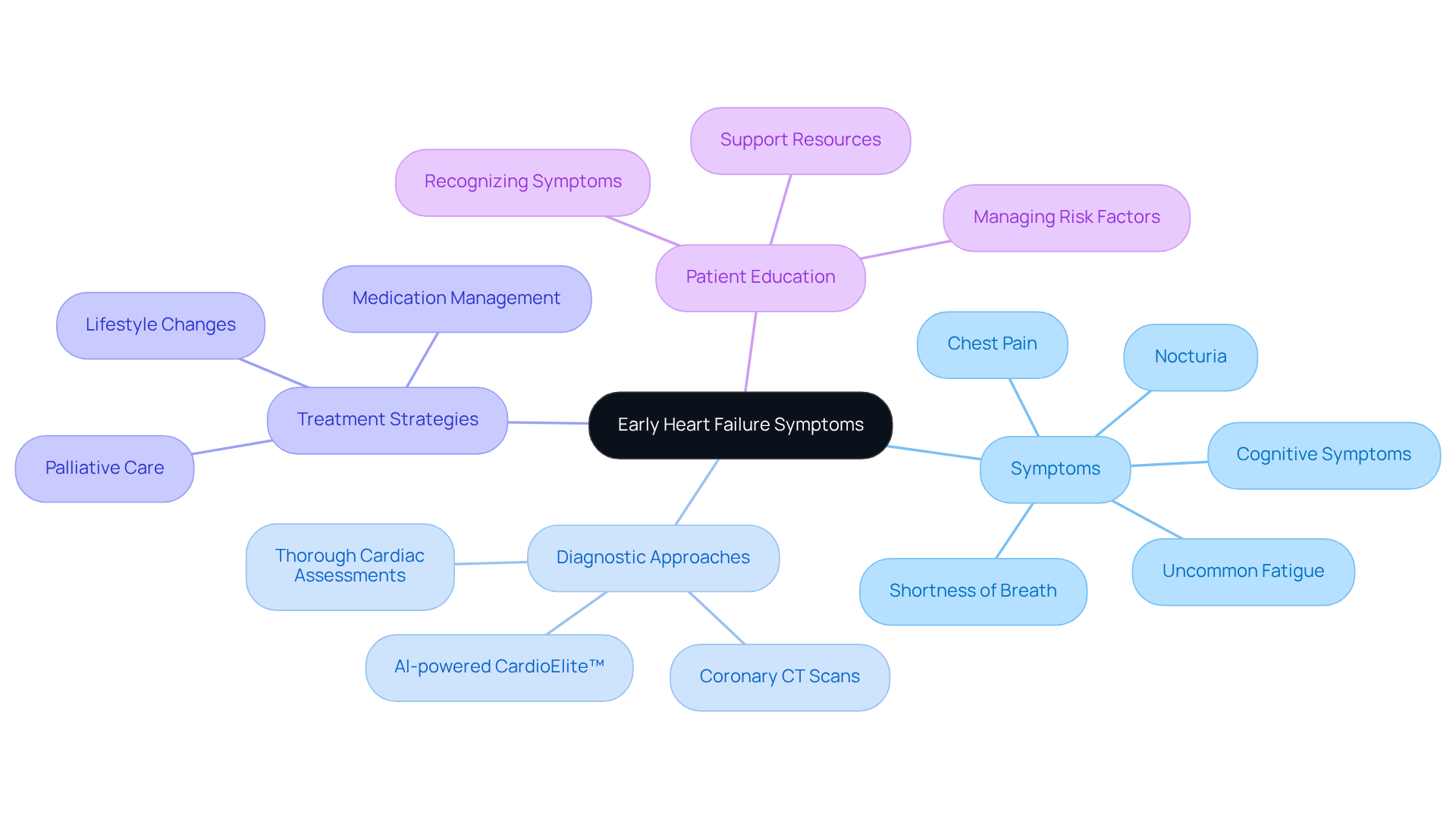
Shortness of breath, or dyspnea, is often the most noticeable among heart failure signs, particularly in older adults. This condition can make breathing difficult during physical exertion or even at rest, primarily due to fluid accumulation in the lungs. Such fluid buildup can hinder respiratory function, significantly disrupting daily activities and overall quality of life. Have you or a loved one noticed any changes in breathing patterns? Recent research indicates that around 6.2 million individuals in the U.S. are affected by cardiac dysfunction, with dyspnea being a crucial warning among the heart failure signs that should not be overlooked. If you notice heart failure signs like heightened breathlessness or a constant cough, it’s important to share these symptoms with your healthcare provider promptly. Timely intervention can lead to improved management of heart failure signs; in fact, approximately 80% of individuals in a failure clinic can be stabilized with prescribed medication, enhancing their overall outcomes.
Furthermore, unmanaged valve disease can exacerbate these issues, as faulty valve function forces the heart to work harder, resulting in heart failure signs like breathlessness and fatigue. At Amavita Heart and Vascular Health, Dr. Martinez-Clark specializes in minimally invasive valve treatments that can repair or replace damaged valves without the need for open-heart surgery. This approach can significantly improve breathing and energy levels. Our innovative AI-powered CardioElite™ program enhances early detection and patient outcomes by providing real-time guidance and accurate imaging for cardiac diagnostics. This ensures that patients receive timely and personalized care. Remember, you are not alone in this journey, and reaching out for support can make a significant difference in your health and well-being.
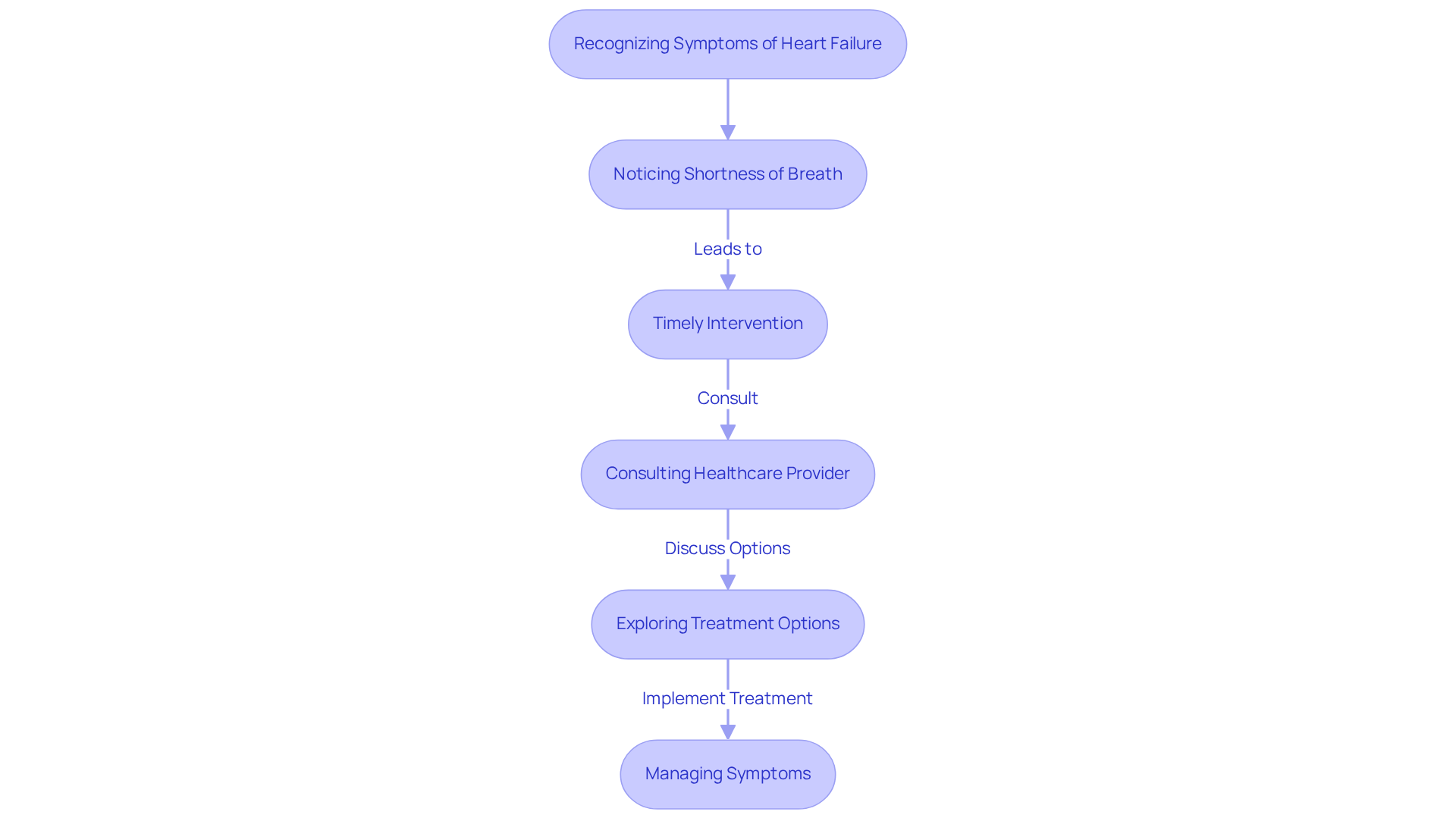
Swelling in the legs, ankles, and abdomen can often be considered heart failure signs, particularly when linked to valve disorders. When the heart struggles to pump effectively due to these valve issues, fluid retention may occur, resulting in noticeable swelling.
It’s important for patients to keep an eye out for any sudden or significant swelling, as this could be one of the heart failure signs that indicate the need for immediate medical attention.
At Amavita Heart and Vascular Health, Dr. Martinez-Clark is dedicated to offering minimally invasive procedures that address these valve problems, ultimately enhancing cardiac function and relieving discomfort.
Remember, prompt intervention is crucial; it can significantly help in managing symptoms and improving your overall cardiovascular health. You are not alone in this journey, and support is available to guide you toward better health.
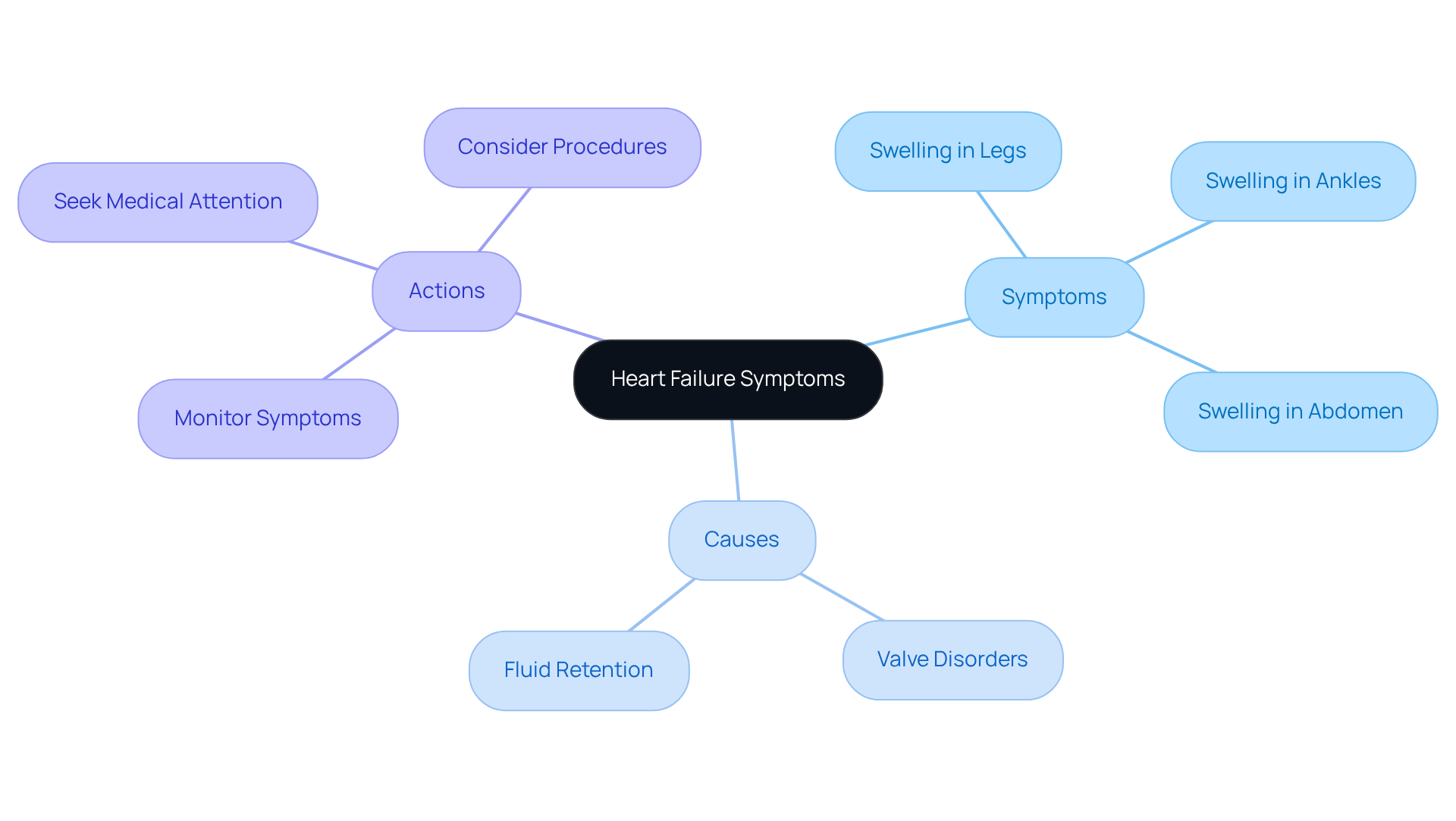
A persistent cough, particularly one that produces pink or white mucus, can be a significant indicator of cardiac dysfunction, often due to fluid buildup in the lungs. This condition, known as pulmonary edema, occurs when the heart struggles to pump blood effectively, leading to increased pressure in the blood vessels of the lungs. It’s important for patients to pay close attention to any changes in their cough, especially if it worsens at night or during physical activity. Additionally, an unexpected weight gain of more than 2-3 pounds in a day or 5 pounds in a week may signal a worsening cardiac condition, making it crucial to inform your healthcare provider promptly.
In the U.S., approximately 6.7 million individuals face cardiac issues, highlighting the importance of recognizing heart failure signs, such as a persistent cough. Healthcare professionals often refer to this as a 'cardiac cough,' and it’s essential to understand that coughing can stem from various causes. As MaryAnn De Pietro, CRT, wisely notes, 'Coughing due to congestive cardiac condition may indicate that the ailment is worsening.' Early detection and intervention can significantly enhance outcomes, particularly with the support of Amavita Heart and Vascular Health®’s comprehensive cardiac evaluations and innovative AI-powered diagnostic technology, which improves early detection and patient outcomes.
Moreover, embracing preventive strategies like lifestyle changes and personalized interventions can further reduce the risks associated with cardiac issues. Addressing cardiovascular concerns promptly can alleviate coughing and enhance overall quality of life by identifying heart failure signs. Regular check-ups and open communication with healthcare providers are vital for monitoring these symptoms and adjusting treatment plans as necessary, ensuring that individuals receive tailored cardiac care that meets their unique needs and lifestyles.
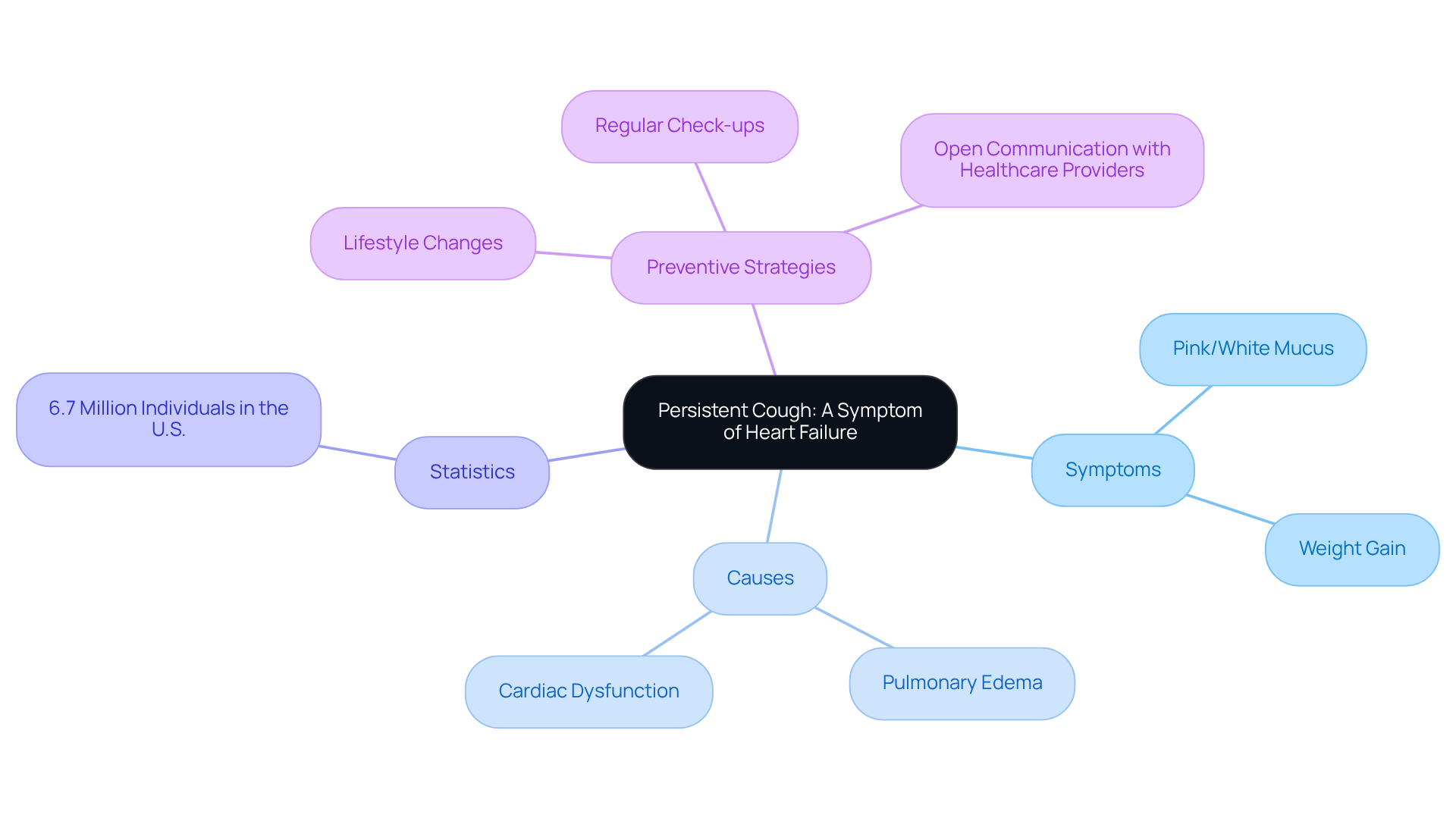
Exhaustion and frailty are common concerns for individuals facing cardiac dysfunction, as these can be heart failure signs that significantly impact daily life. This fatigue often stems from heart failure signs, which indicate the heart's reduced ability to pump blood effectively, leading to less oxygen reaching vital tissues. Recent statistics reveal that notable levels of fatigue were observed in 50.4% of men and 51.2% of women with cardiac failure, underscoring a vital connection between cardiac health and energy levels, particularly in seniors.
Geriatricians emphasize that persistent fatigue should be considered one of the heart failure signs rather than simply a normal part of aging. It's important to engage in open discussions with healthcare providers to uncover any underlying issues. At Amavita Cardiac and Vascular Health, we conduct thorough evaluations aimed at identifying the specific causes of fatigue. This allows us to create personalized treatment plans that focus on improving cardiac function and revitalizing energy levels.
Dr. Lorraine Evangelista notes, "Fatigue in individuals with HF is linked to both clinical and psychosocial factors, presenting several targets for intervention." Effectively managing fatigue can greatly enhance the quality of life for elderly individuals with cardiac concerns. It is essential for both patients and caregivers to promptly recognize and address the heart failure signs. Keeping a fatigue diary to monitor symptoms can lead to more productive conversations with healthcare providers, ensuring that appropriate interventions are considered.
Moreover, our preventive cardiology approach helps reduce the risk of cardiac events through advanced risk assessment tools and customized strategies, further supporting the health and well-being of those we serve. We are here to help you navigate these challenges with compassion and care.
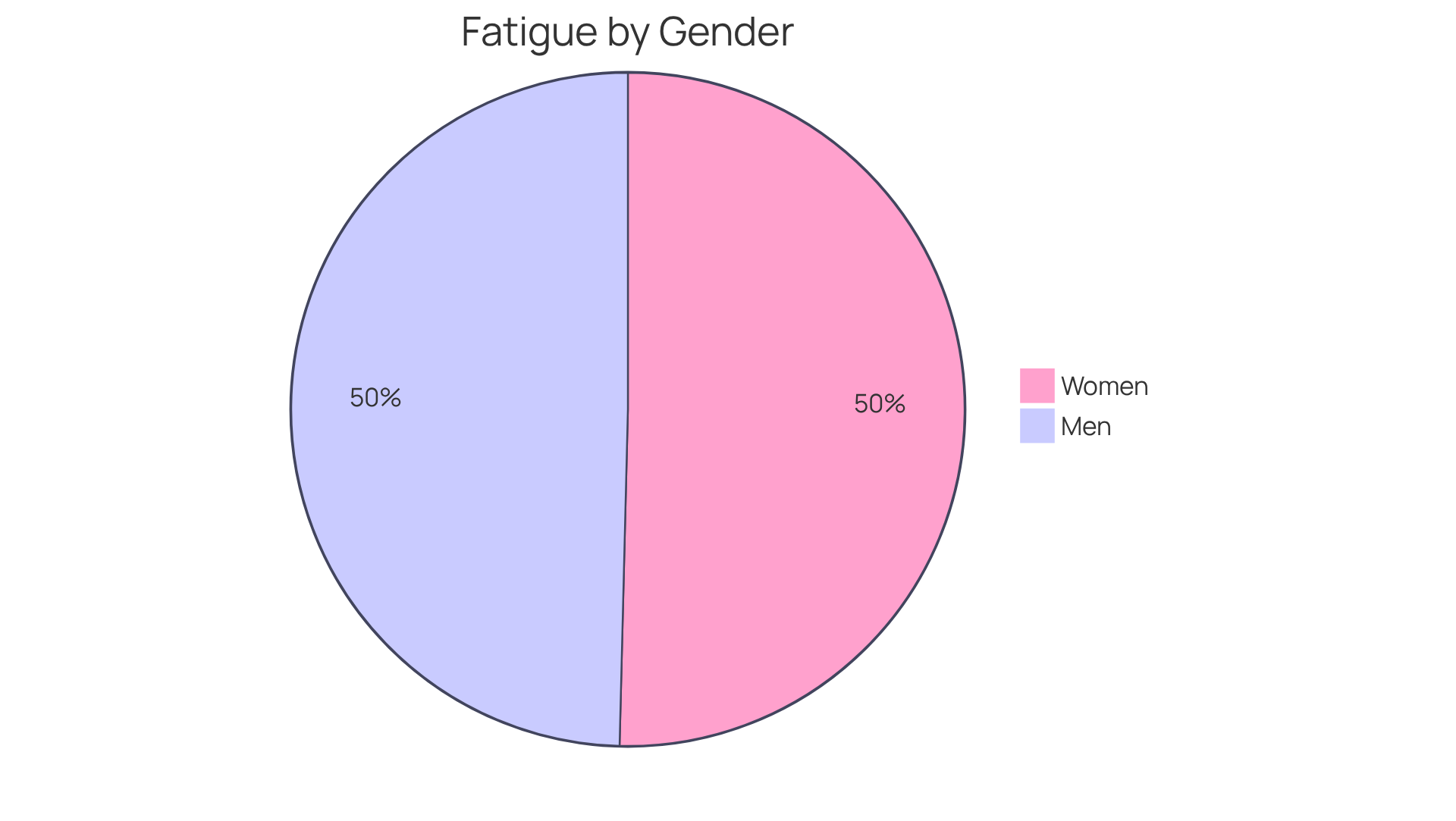
Sudden weight gain, particularly if it exceeds two pounds in a single day, can be a critical warning sign of heart failure signs associated with fluid retention. It's important for individuals, especially those at higher risk, to consistently track their weight. Even slight variations can indicate worsening conditions. For example, gaining more than five pounds within a week may require immediate medical attention.
By regularly monitoring their weight, patients can detect early heart failure signs, such as edema, and share significant changes with their healthcare provider. This proactive approach not only aids in managing cardiac issues but also plays a vital role in preventing unnecessary hospital stays.
Have you considered discussing your weight fluctuations with healthcare professionals? This dialogue can lead to timely interventions, ultimately promoting better health outcomes for elderly individuals facing cardiac challenges. Remember, you are not alone in this journey; support is always available.

Heart dysfunction can lead to significant emotional challenges such as anxiety, depression, and feelings of isolation. It's understandable to feel overwhelmed by the psychological weight of a cardiac diagnosis, which can negatively impact overall health and complicate adherence to treatment strategies. Recent findings indicate that anxiety and depression are prevalent among older individuals facing cardiac issues. Research shows that these conditions can lead to worse health outcomes and increased hospitalization rates. For instance, cardiovascular dysfunction in individuals over 60 is associated with declining cognitive abilities, heightened depression, and reduced self-care over six months.
It's crucial for individuals to feel comfortable discussing their emotional challenges with their healthcare team. By fostering a nurturing environment, healthcare practitioners can offer essential resources and interventions to help address these emotional difficulties. This support can significantly enhance the quality of life for those affected by cardiac issues. As emphasized by specialists, including Glenn N. Levine, M.D., FAHA, prioritizing mental well-being is vital for improving treatment adherence and overall recovery in individuals with cardiovascular conditions.
Moreover, innovative cardiac rehabilitation strategies have shown promise in enhancing quality of life and alleviating depression among hospitalized individuals with cardiovascular issues. This highlights the importance of integrated care methods that consider both physical and emotional health. Remember, you are not alone in this journey, and there are compassionate professionals ready to support you every step of the way.
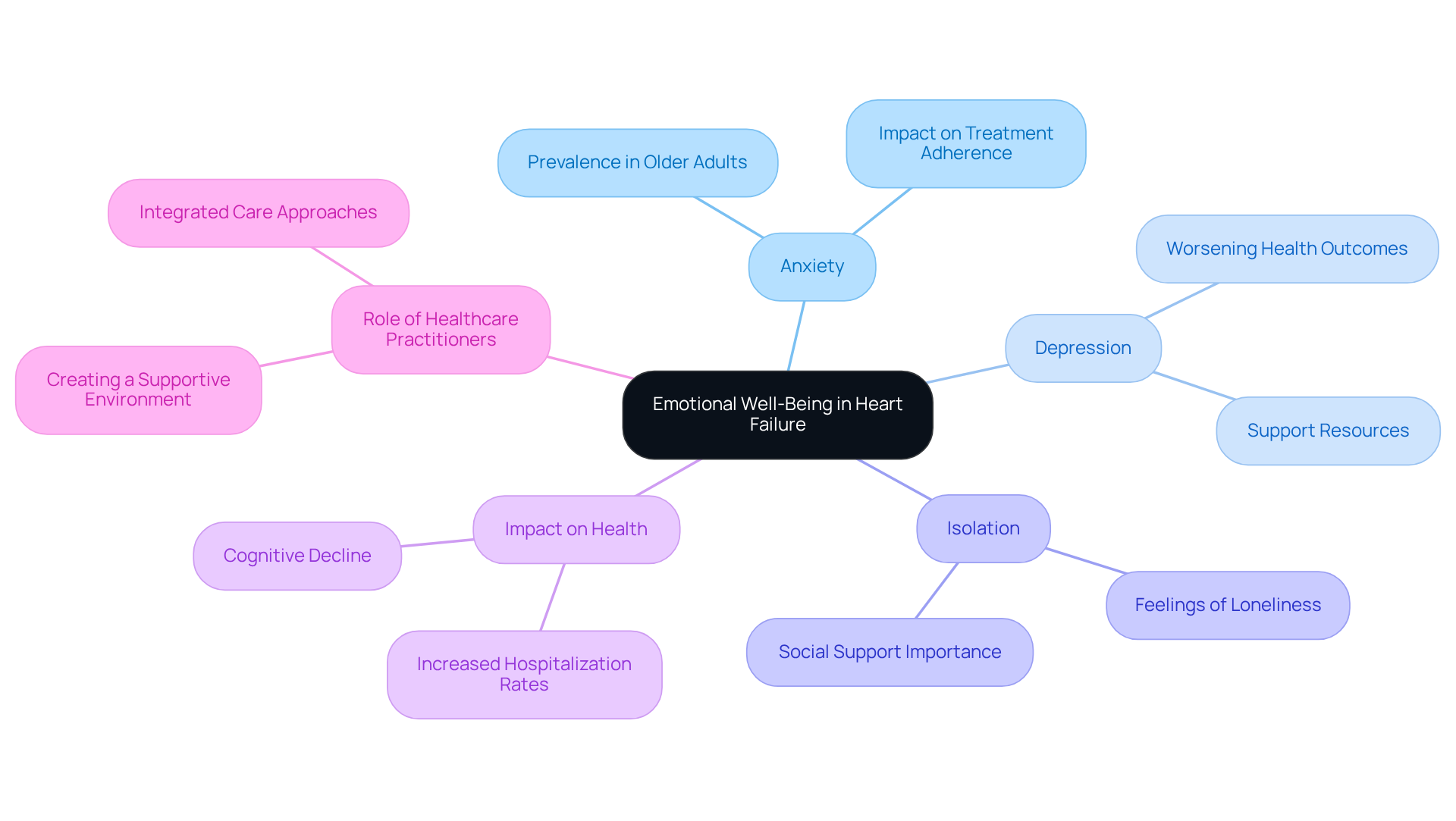
Sleep disturbances, particularly insomnia and sleep apnea, are common among individuals with cardiac issues, significantly impacting their overall health. It's concerning to note that around 75% of people with cardiac issues experience sleep disturbances, with between 50% and 75% specifically affected by sleep apnea. These challenges can worsen symptoms like fatigue and shortness of breath. Insomnia, characterized by difficulties in initiating sleep, maintaining sleep, or waking too early, affects 23% to 73% of individuals with cardiac issues. Additionally, sleep apnea, which includes both obstructive and central types, is prevalent in this population, impacting 51% to 71% of patients and contributing to poor clinical outcomes.
Experts highlight the importance of addressing these sleep challenges. Dr. Brooke Shafer, a respected investigator in sleep health, notes that improving sleep consistency may serve as an affordable treatment option to reduce negative outcomes in adults with cardiac issues. Importantly, moderately irregular sleep increases the risk of experiencing another clinical event within six months after hospitalization for cardiac issues. Furthermore, effectively managing sleep apnea can lead to significant improvements in cardiac health, thereby enhancing individuals' quality of life.
If you are experiencing sleep problems, it is vital to engage in open discussions with your healthcare providers. Exploring the possibility of sleep studies can help you gain a better understanding of your condition. By addressing insomnia and sleep apnea, you may improve your cardiovascular health and overall well-being, leading to a better quality of life. Additionally, lifestyle medicine—encompassing stress management and a nutritious diet—can play a crucial role in alleviating symptoms of cardiac issues and enhancing sleep quality. It is also essential to consider the timing of diuretic medications, as taking them later in the day may cause nocturia, disrupting your sleep.
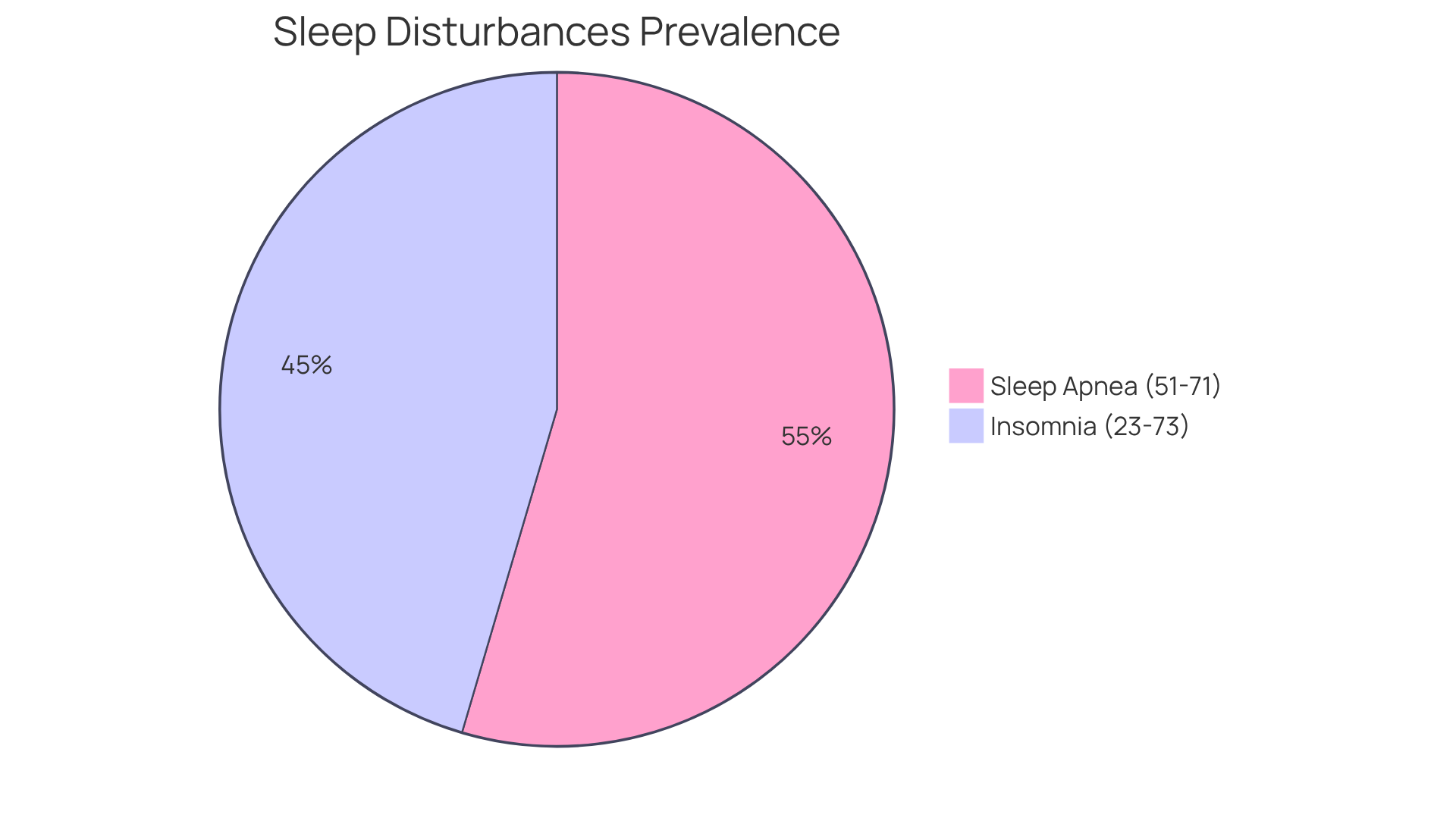
Many individuals with cardiac dysfunction often experience changes in appetite, such as a decreased desire to eat and feelings of nausea. This is primarily due to reduced blood circulation to the digestive system. Such changes can lead to significant weight loss and nutritional deficiencies, particularly concerning for older adults. Did you know that research indicates at least 22% of those with cardiovascular issues report a reduced appetite? This concern can persist even after an acute cardiovascular decline.
It’s essential for patients to closely monitor their eating habits and share any changes with their healthcare providers. Adequate nutrition is crucial in managing cardiac issues, as it can directly influence overall health outcomes. Dietitians emphasize that a balanced diet rich in fruits, vegetables, whole grains, and lean proteins is vital. Additionally, reducing salt and unhealthy fats can greatly promote cardiovascular wellness.
By meeting these nutritional needs, individuals can help mitigate the negative effects of cardiac issues and improve their quality of life. As Dr. John Jefferies notes, maintaining cardiac muscle function through proper nutrition is essential for those facing cardiac distress. Elderly patients are encouraged to actively engage in monitoring their dietary habits and consult with healthcare providers about their nutrition. Remember, you are not alone in this journey; support is available to help you manage your condition effectively.
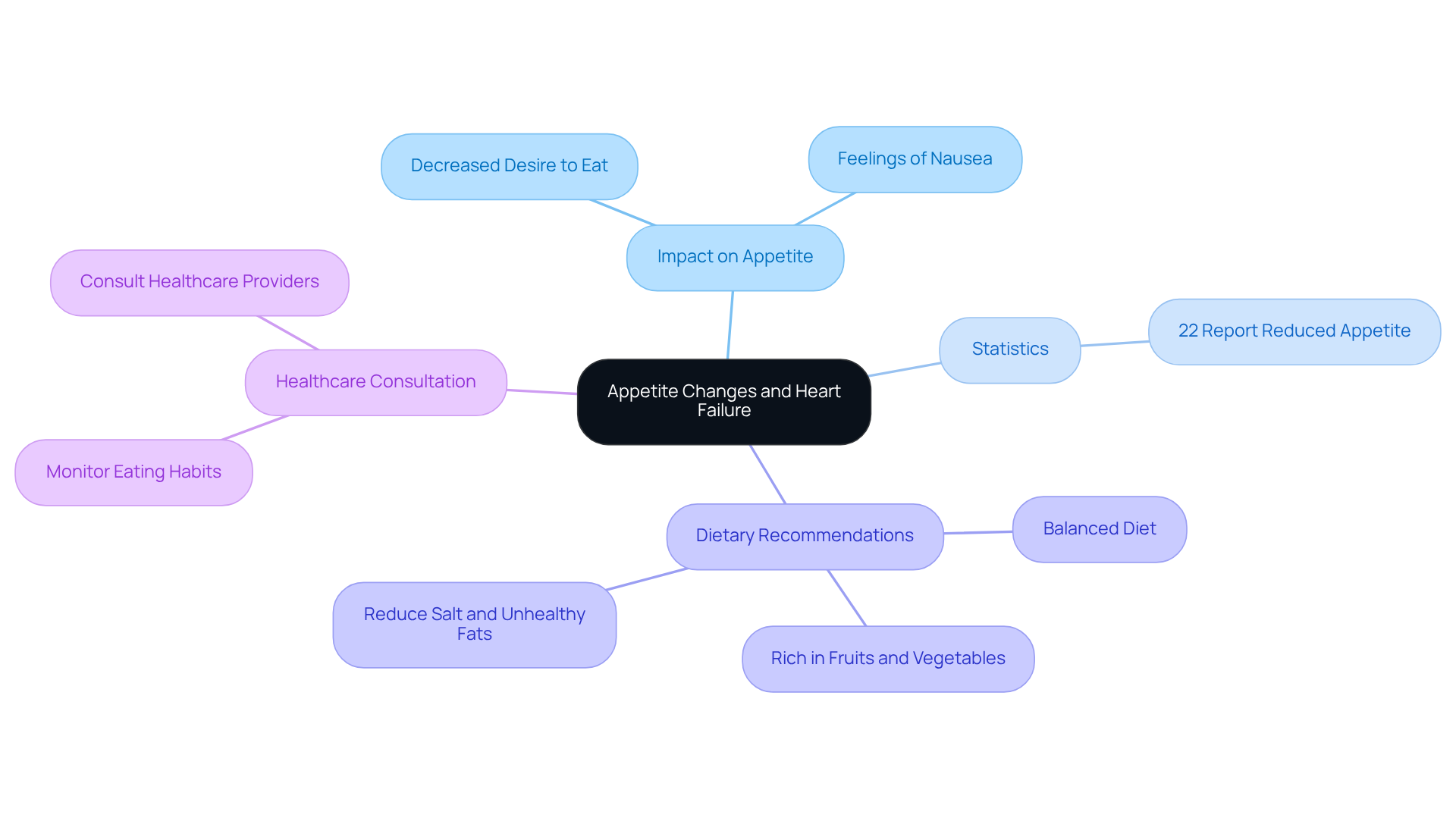
Identifying the heart failure signs is crucial for timely intervention. If you experience heart failure signs such as:
it is important to seek medical consultation without delay. Difficulty in breathing may indicate valve disease, where valves do not function properly, causing the heart to work harder and leading to issues like breathlessness and fatigue. At Amavita Heart and Vascular Health, Dr. Martinez-Clark specializes in minimally invasive valve treatments that can repair or replace damaged valves without the need for open-heart surgery. This often allows for same-day discharge and significant improvements in your breathing and energy levels.
Feeling unusual fatigue during daily activities can indicate heart failure signs as well as various cardiac conditions, including:
Our comprehensive cardiac assessments at Amavita help determine the specific causes of fatigue and other symptoms, enabling us to create personalized treatment strategies aimed at enhancing cardiac performance and revitalizing your energy levels.
Cardiologists stress that recognizing heart failure signs is essential, as early intervention can slow the progression of the disease and improve outcomes. Additionally, timely medical guidance can reduce hospital admissions and mortality rates among older adults. In 2021, cardiac issues were responsible for approximately 425,147 fatalities, accounting for 45% of cardiovascular-related deaths. At Amavita Heart and Vascular Health, we are committed to providing comprehensive care and support for individuals facing the challenges of heart failure, ensuring you receive the attention and treatment necessary for improved health. Our innovative AI-powered diagnostic technology enhances early detection and patient outcomes, reinforcing our commitment to delivering high-quality cardiac care.
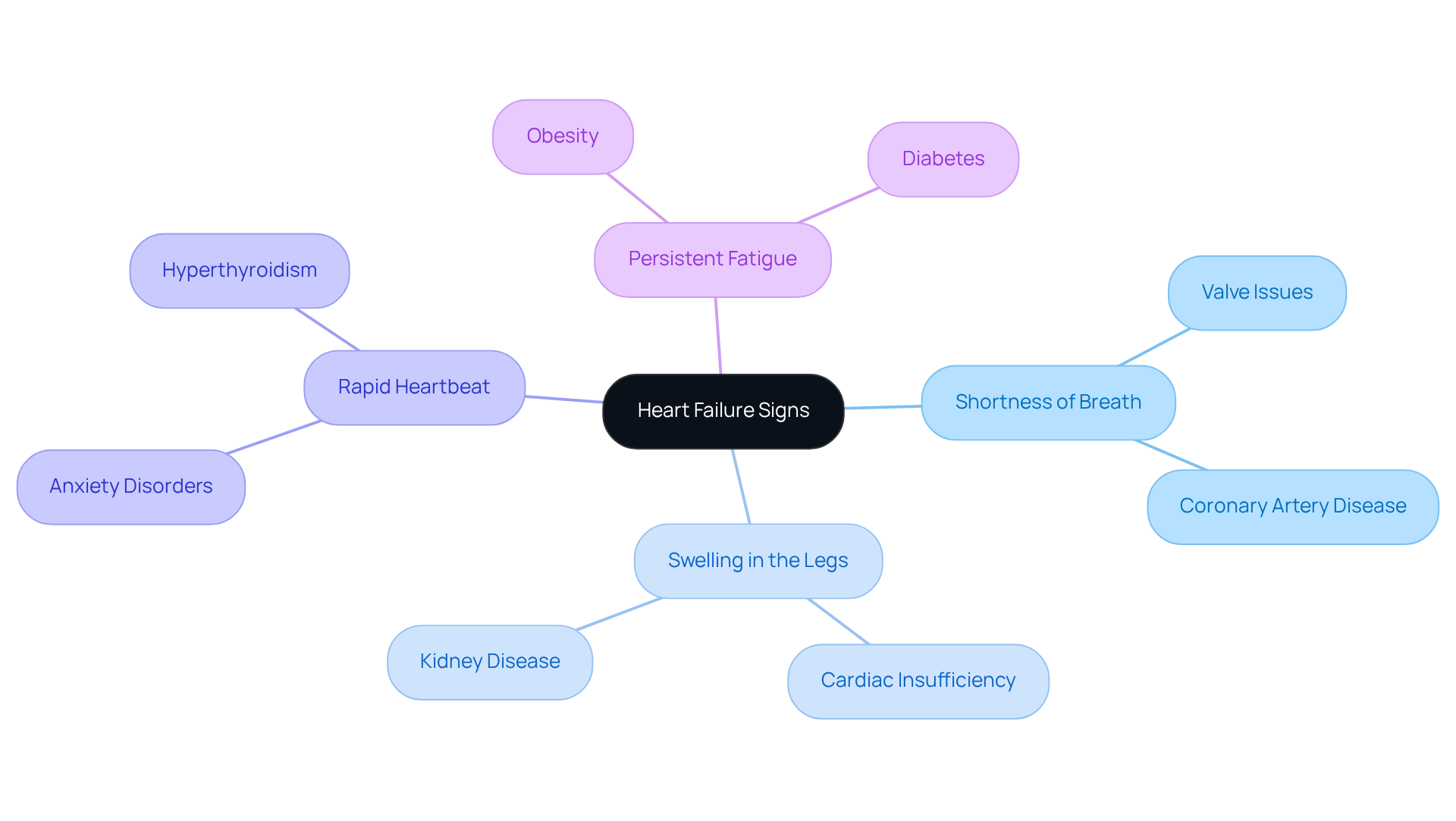
Recognizing the signs of heart failure is vital, especially for elderly patients who may attribute symptoms like fatigue and shortness of breath to normal aging. Being aware of these indicators can lead to early diagnosis and timely treatment, significantly improving quality of life. By understanding and identifying these symptoms, individuals can take proactive steps toward better heart health.
Throughout this article, we have discussed key heart failure signs such as:
Each symptom plays a crucial role in understanding the overall health of elderly patients, highlighting the importance of seeking medical advice promptly. Facilities like Amavita Heart and Vascular Health integrate advanced diagnostic tools and personalized care strategies, reinforcing the significance of early detection and intervention.
Ultimately, it is essential to prioritize heart health and remain vigilant about any changes in physical or emotional well-being. Engaging in open conversations with healthcare providers about potential symptoms can lead to effective management and support. By fostering awareness and taking action, individuals can navigate the challenges of heart failure and enhance their overall well-being. Remember, you are not alone in this journey; support is available to help every step of the way.
What are the early signs of heart failure to be aware of?
Early signs of heart failure include unusual shortness of breath, uncommon fatigue during daily activities, and swelling in the legs, ankles, and abdomen. These symptoms may be mistaken for normal aging but can indicate underlying cardiac issues.
Why is it important to recognize early heart failure symptoms?
Recognizing early heart failure symptoms is essential for facilitating early diagnosis and treatment, which can improve quality of life and cardiovascular function.
How does Amavita Heart and Vascular Health assist in identifying heart failure symptoms?
Amavita Heart and Vascular Health conducts thorough cardiac assessments to pinpoint the origins of heart issues and develops tailored treatment strategies. They also utilize the AI-powered CardioElite™ program for advanced diagnostic technology and early detection.
What is shortness of breath, and why is it significant in heart failure?
Shortness of breath, or dyspnea, is a key indicator of heart failure, often making breathing difficult during physical exertion or at rest due to fluid accumulation in the lungs. It is a crucial warning sign that should not be overlooked.
How common is dyspnea among individuals with heart failure?
Recent research indicates that around 6.2 million individuals in the U.S. are affected by cardiac dysfunction, with dyspnea being a significant warning sign of heart failure.
What should I do if I notice signs of heart failure?
If you notice signs of heart failure, such as heightened breathlessness or a constant cough, it is important to share these symptoms with your healthcare provider promptly for timely intervention.
How can valve disease affect heart failure symptoms?
Unmanaged valve disease can exacerbate heart failure symptoms by forcing the heart to work harder, leading to increased breathlessness and fatigue.
What treatments does Dr. Martinez-Clark offer for valve issues?
Dr. Martinez-Clark specializes in minimally invasive valve treatments that can repair or replace damaged valves without the need for open-heart surgery, significantly improving breathing and energy levels.
What role does the CardioElite™ program play in heart health management?
The CardioElite™ program enhances early detection and patient outcomes by providing real-time guidance and accurate imaging for cardiac diagnostics, ensuring timely and personalized care.
How can I seek support for my heart health concerns?
If you have concerns about your heart health, you are encouraged to reach out for support. Amavita Heart and Vascular Health is dedicated to helping you every step of the way in managing your health.